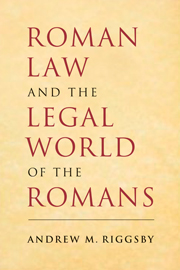Book contents
- Frontmatter
- Contents
- ROMAN LAW AND THE LEGAL WORLD OF THE ROMANS
- 1 Introduction
- 2 Roman History – The Brief Version
- 3 Sources of Roman Law
- 4 Sources for Roman Law
- 5 The Legal Professions
- 6 Legal Education
- 7 Social Control
- 8 Legal (In)equality
- 9 Writing and the Law
- 10 Status
- 11 Civil Procedure
- 12 Contracts
- 13 Ownership and Possession
- 14 Other Rights over Property
- 15 Inheritance
- 16 Women and Property
- 17 Family Law
- 18 Delict
- 19 Crimes and Punishments
- 20 Religious Law
- 21 Law in the Provinces
- 22 Conclusion
- Documents
- Glossary
- Further Reading
- Index
6 - Legal Education
Published online by Cambridge University Press: 05 June 2012
- Frontmatter
- Contents
- ROMAN LAW AND THE LEGAL WORLD OF THE ROMANS
- 1 Introduction
- 2 Roman History – The Brief Version
- 3 Sources of Roman Law
- 4 Sources for Roman Law
- 5 The Legal Professions
- 6 Legal Education
- 7 Social Control
- 8 Legal (In)equality
- 9 Writing and the Law
- 10 Status
- 11 Civil Procedure
- 12 Contracts
- 13 Ownership and Possession
- 14 Other Rights over Property
- 15 Inheritance
- 16 Women and Property
- 17 Family Law
- 18 Delict
- 19 Crimes and Punishments
- 20 Religious Law
- 21 Law in the Provinces
- 22 Conclusion
- Documents
- Glossary
- Further Reading
- Index
Summary
I begin this chapter with three very general observations. (1) While Roman education took on mostly Greek forms, education in the law had no real Greek precedents. Formal legal education is thus generally thought of as Rome's great innovation in pedagogy. (2) While basic literacy was expected of women of the upper classes in Rome, and while a few even became quite learned on their own, they were cut off from most advanced education by custom. Moreover, they were banned from most courtroom activity by rule. Hence, the references below to “men,” “sons,” “he,” and so forth are meant to have their full, gendered force. (3) The evidence for Roman legal education is a little peculiar. We have essentially two snapshots of standard practices at two particular times – the late Republic and the later Empire – and a slightly broader but also less detailed view of what went on in the first two centuries of the Empire. We have virtually no information on the transitions between these phases. In what follows, I will simply treat the three phases in chronological order.
Before discussing Republican legal education, it is important first to know a few things about Republican education more generally. By the later part of the Republic (if not much before), the formal education of the Roman upper classes had become fairly standardized.
- Type
- Chapter
- Information
- Roman Law and the Legal World of the Romans , pp. 57 - 66Publisher: Cambridge University PressPrint publication year: 2010



